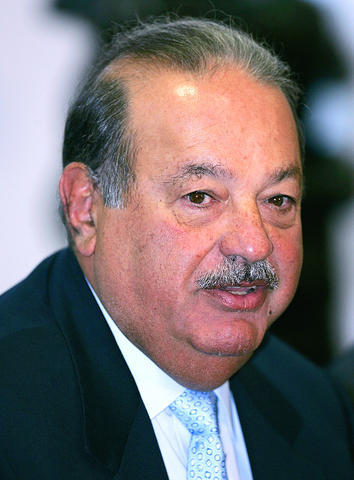Billionaire Carlos Slim said he doesn't care if he is the world's richest man, and promised to donate hundreds of thousands of laptop computers to Mexican children.
The Mexican telecom mogul pledged on Thursday to donate 250,000 low-cost laptops to children by the end of the year and as many as 1 million next year, saying "digital education" holds the key for Mexico's poor.
Slim is listed by Forbes as the world's second-richest man with holdings worth US$53 billion, but some financial analysts say he may have overtaken Microsoft founder Bill Gates as the world's richest.

PHOTO: AP
Speaking to foreign correspondents on Thursday, Slim said the ranking meant little to him.
"That's water off a duck's back to me," Slim said. "I don't know if that [the ranking] is correct, if I'm first, 20th, or 2,000th. It doesn't matter. It's all the same."
"I think that what's important is to see that a professional or business activity isn't incompatible with personal or family life," he said.
He also expressed no interest in competing with Gates in philanthropy, saying he hoped their efforts would "complement each other." The Bill and Melinda Gates Foundation has channeled its efforts into reducing hunger and fighting disease in developing countries.
Slim said he wants to focus on building specialized preschools, handing out computers and supporting health care.
He said he would devote about US$70 million this year to the low-cost laptop program. With an estimated cost of US$250 to US$300 per machine, Slim would have to devote US$300 million to reach a goal of 1 million per year. He predicted, however, that costs for the machines would fall further.
Slim, who controls Mexico's largest fixed-line telephone company, Telefonos de Mexico, or Telmex, said the plan would initially put the laptops in libraries and schools, which would eventually give them outright to students.
"The scheme in public libraries would be for them to lend them out, like books," he said, noting his companies would help set up wireless networks to which the machines could connect.
Within four years, he wants to build about 100 "early stimulation" preschools to give poor children training at a young age in math, language and computers.
He said the world economy is experiencing "a stage of world euphoria" of easy credit, and that Latin America should take advantage of that to invest in infrastructure.
Slim said there is no conflict between his role as businessman -- in which he has been criticized for holding a near-monopoly control over the telephone market -- and philanthropist.
"The best investment one can make is to reduce poverty," he said, noting that wealthier citizens are better consumers.

MORE VISITORS: The Tourism Administration said that it is seeing positive prospects in its efforts to expand the tourism market in North America and Europe Taiwan has been ranked as the cheapest place in the world to travel to this year, based on a list recommended by NerdWallet. The San Francisco-based personal finance company said that Taiwan topped the list of 16 nations it chose for budget travelers because US tourists do not need visas and travelers can easily have a good meal for less than US$10. A bus ride in Taipei costs just under US$0.50, while subway rides start at US$0.60, the firm said, adding that public transportation in Taiwan is easy to navigate. The firm also called Taiwan a “food lover’s paradise,” citing inexpensive breakfast stalls

TRADE: A mandatory declaration of origin for manufactured goods bound for the US is to take effect on May 7 to block China from exploiting Taiwan’s trade channels All products manufactured in Taiwan and exported to the US must include a signed declaration of origin starting on May 7, the Bureau of Foreign Trade announced yesterday. US President Donald Trump on April 2 imposed a 32 percent tariff on imports from Taiwan, but one week later announced a 90-day pause on its implementation. However, a universal 10 percent tariff was immediately applied to most imports from around the world. On April 12, the Trump administration further exempted computers, smartphones and semiconductors from the new tariffs. In response, President William Lai’s (賴清德) administration has introduced a series of countermeasures to support affected

CROSS-STRAIT: The vast majority of Taiwanese support maintaining the ‘status quo,’ while concern is rising about Beijing’s influence operations More than eight out of 10 Taiwanese reject Beijing’s “one country, two systems” framework for cross-strait relations, according to a survey released by the Mainland Affairs Council (MAC) on Thursday. The MAC’s latest quarterly survey found that 84.4 percent of respondents opposed Beijing’s “one country, two systems” formula for handling cross-strait relations — a figure consistent with past polling. Over the past three years, opposition to the framework has remained high, ranging from a low of 83.6 percent in April 2023 to a peak of 89.6 percent in April last year. In the most recent poll, 82.5 percent also rejected China’s

PLUGGING HOLES: The amendments would bring the legislation in line with systems found in other countries such as Japan and the US, Legislator Chen Kuan-ting said Democratic Progressive Party (DPP) Legislator Chen Kuan-ting (陳冠廷) has proposed amending national security legislation amid a spate of espionage cases. Potential gaps in security vetting procedures for personnel with access to sensitive information prompted him to propose the amendments, which would introduce changes to Article 14 of the Classified National Security Information Protection Act (國家機密保護法), Chen said yesterday. The proposal, which aims to enhance interagency vetting procedures and reduce the risk of classified information leaks, would establish a comprehensive security clearance system in Taiwan, he said. The amendment would require character and loyalty checks for civil servants and intelligence personnel prior to